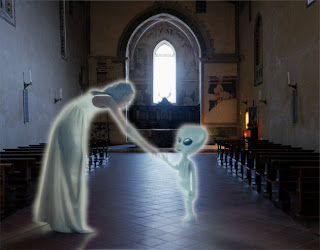One of our summer projects is running Library Orientation sessions for incoming freshmen (class of '12... makes me feel real ancient). The UGLibrarians have come up with a pretty sweet instructional style for these half-hour sessions.
Let us set the scene...

THE STUFF - 7 tables full of library resources (mostly books, but some newer technologies are also represented).
THE PEOPLE - overwhelmed and/or cocky 17 and 18 year olds, 50-ish per session, in groups of 6-10 per table.
THE ACTIVITY - a worksheet, the students try to figure out the themes of their tables (not that hard), say what the stuff can be used for, then present their findings to the entire session.
THE SPACE - the Grad Gallery, decked out in the finest signs and banners.
US - Emily H, who hates hamsters; Katie D-T, who has enjoyed Delerium Tremens (a belgian brew) but never had the DTs.
OUR LOVELY ASSISTANTS - one rotating UGLi Babe (that's a librarian, to the uninitiated).
Now that we have laid our stage, please allow us to entertain you with a story or three...
1. One of our fellow librarians, Renoir, has an excellent presentation style. Not unlike an improvisational jazz musician, Renoir riffs on the things the students say (i.e. he uses the openings the youngsters provide to regale us all with stories of the library which swell and reach new heights and show off his oratorial prowess).
Our favorite Renoir story came up in multiple orientation sessions. One day, a student asked, "Is there a limit to the number of books we can check out?" Smiling slightly, Renoir responded "I'm glad you asked," and proceeded seemlessly into this wonderful story.
Several years back, some student groups banded together to protest against another club. They were nerdy and creative and they decided to center their direct action on the library system. On one fateful day, these students rented U-Haul trucks and parked them outside the library. They brought armful after armful after book truck of library books to the circulation desk, hoping to stun the library -- and the university -- in its tracks. The students were successful. Every library staffer had to stop what they were doing and spend their entire day checking out books and loading books into U-Hauls. The librarians complained to their supervisors, and the complaints made their way up to University Administration. The student groups, through a clever knowledge of library policies, eventually emerged victorious.
2. One of our more adolescent incoming students shared with some 70-odd entering Wolverines a picture of a penis he and his tablemates found in a graphic novel. Emily, noticing that each novel at the table was open to its most explicit content, made a quick recovery, acknowledging the penis and addressing the major Graphic Novels Table talking points, thus saving orientation.
 3.
3. Katie ended a solid session with a solid quote by pop princess Shakira. The musical theater students she was orientating were impressed, and began to sing the song. Quote: "So, librarians are available whenever, wherever ... we're meant to be together.... yeah, I just ended with a Shakira quote."
























